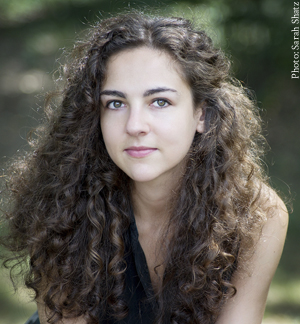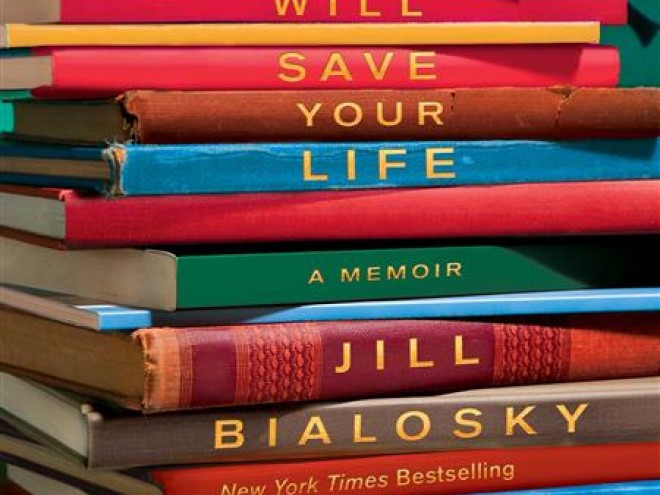Yelena Akhtiorskaya was recently named one of the National Book Foundation’s 2014 5 Under 35 Honorees. Her debut novel Panic in a Suitcase was published in July by Riverhead.
 Nat Bernstein: What was the impetus behind Panic in a Suitcase? What inspired the novel, and what pushed you to write it?
Nat Bernstein: What was the impetus behind Panic in a Suitcase? What inspired the novel, and what pushed you to write it?
Yelena Akhtiorskaya: The impetus for Panic in a Suitcase was really just the vague but potent need to write that is always present, always nagging, like a feral beast-child that will bite off your arm if you don’t keep throwing things at it. The only thing I happened to have on hand was “my experience.” I wish I could’ve given it something tastier and more satisfying, but it was an emergency situation and the most important thing is that I saved myself — for now.
The inspiration was my family and the hilarious and devastating absurdity that is Brighton Beach. What pushed me to write it, other than compulsion, was a desire to chronicle, understand, and conquer.
NLB: Your bio indicates that you share roots in Odessa and Brighton Beach in common with your characters. To what extent is the novel autobiographical?
YA: With the novel it’s hard to say, but my bio is almost entirely autobiographical.
NLB: As a writer, where or how do you see your fiction and nonfiction writing interact?
YA: I don’t write very much nonfiction, and, to be honest, when I do I have the sense that I’m tricking somebody because I don’t entirely understand the distinction. A piece of writing is either good or not. The good is true, the not good is false. Everything a person writes should be infused with her opinions, thoughts, feelings, moods, dreams. Basically, the goal is to have a really good infusion mechanism worked out.
NLB: We tend to focus on the isolation and perpetual homelessness of the immigrant experience (I’m thinking of Jhumpa Lahiri’s stories, in particular, or Junot Diaz, Julie Otsuka) but the cast of Panic in a Suitcase convey the opposite phenomenon: the transplants — Marina, Esther, Robert — share a groundedness in where they are and connectivity with the members of their family and acquaintances, while Frida and Pasha seem individually alienated and alienating both at home and abroad. Do you find something unifying in the immigrant experience of which perhaps their rooted relatives feel an absence or distance?
YA: For better or worse, you take yourself wherever you go, so people who are grounded, practical, sane, and social in the old country, will be the same in their new land, whereas people who are miserable, unbearable, and isolated are going to stay that way wherever they go (which is why it’s probably best they stay put). Pasha and Frida are of the latter variety. It doesn’t matter where they are. The outside world, made of crowds and noise, is there to be bristled against and pushed out. But I absolutely think immigration can be invigorating, and serve to strengthen bonds.
NLB: Pasha is set (or sets himself) apart from his family in every conceivable way: a poet in a family of medicine, he languishes in Odessa rather than joining his eager parents and sister in the United States — and renounces his religious heritage for Christianity. What do you feel is the starkest line of division between him and his immediate relatives?
YA: The Atlantic Ocean is a pretty good partition, even considering Skype. There’s just something to be said for sheer distance. Essentially, the starkest line of division is an invisible one — it’s something inside of Pasha that allows him to have an independent way of thinking and to make the decisions that then seem to be the things that set him apart. The specific decisions matter less. Pasha could’ve substituted Christianity with a lot of things. But I don’t know if he could’ve been as apart if he lived on the same block in Brighton Beach.
NLB: Is Pasha — as the persona of Pavel Robertovich Nasmertov, “the great Russian poet” — based or inspired by a real-life or literary figure?
YA: I should probably be coy about this, but my uncle is a Russian poet, and he is pretty great.
NLB: Do you share Frida’s sublimated belief that “old Odessa’s greatness lay solely in its Jews” — many of whom relocated to the community in which you grew up?
YA: I think that’s being simplistic about it! Like you said, a large contingent of Odessan Jewry relocated to Brighton Beach and yet it’s very difficult to imagine that the Brighton Beach community ever contributed to a city’s greatness, let alone been solely responsible for it. And I don’t think getting a quarter million Jews to settle in Odessa today would bring back the magic — though some would say that the magic isn’t even gone, and on certain days I might agree; it’s really a lovely city. But I attribute the city’s current loveliness to a mixture of nice architecture, a quaint feeling, the eternal sea breeze, nostalgia, and the glowing embers of true historical specialness. That specialness was a result of many factors, but the Jews were, I think, the most integral.
NLB: The current literary scene is boasting a wealth of novels exploring the simultaneous collective and individual narratives of Soviet immigrant families, pervaded by something of a chronic melancholy, or dissatisfaction, or detachment. Do you think Soviet-heritage writers have been in a sense doomed to write about “unhappy families” since Tolstoy penned the opening to Anna Karenina—does the common exploration of family micro-turmoil stem from a literary legacy, or from something intrinsic to the culture and identity of a Russian-speaking household?
YA: Tolstoy had a catchy line but I think all writers regardless of culture or era are doomed to write about unhappy families because they’re doomed to live in them, and often be the singlehanded cause of the unhappiness. Probably immigrant writers in general are going to be cranking out more family-heavy stuff because often it’s the family unit that gets unmoored and transplanted into a new place where everything is strange and foreign. The walls around the family fortify and inside those walls temperatures rise, resulting in a thick, garlicky, incestuous stew that is irresistible to write about. (What else are you going to do with it?) If there’s anything particularly Russian, though, it’s the chronic melancholy and dissatisfaction. That is the Russian tradition. Russians are fantastic, maybe the best, at suffering.
NLB: What other works inform your writing? Which authors — classic or contemporary — were most influential while you worked on Panic in a Suitcase?
YA: As far as I’m aware, it’s still a mystery how the brain decides which input will inform the output and which will be filed away in some unknown location, never to be accessed again except in polite dinner conversation. Since I don’t have control over this process, it’s necessary to be extremely careful. Even one crappy book is dangerous. While writing this book, I was reading Bellow, Nabokov, Tolstoy, Platonov, Leonard Michaels, Clarice Lispecter, Harold Brodkey. It wasn’t on purpose, but it seems that if I was reading you, you’re Jewish, Russian, or Russian-Jewish, and dead.
NLB: What are you reading now, and what can your readers expect from you next?
YA: I’m reading Musil’s The Man Without Qualities and a statistics textbook. I just read Elaine Kraf’s The Princess of 72nd Street and it is unbelievable. I urge you to read it! As for what’s next, I’ve learned this is a giant letdown, and I apologize in advance, but I’m afraid it’s going to be a story collection.
Nat Bernstein is the JBC Network Coordinator at the Jewish Book Council and a graduate of Hampshire College.
Related Content:
- Reading List: Emerging Voices
- Reading List: Russian/Soviet Jewry
- A Replacement Life by Boris Fishman
- The Betrayers by David Bezmozgis
Nat Bernstein is the former Manager of Digital Content & Media, JBC Network Coordinator, and Contributing Editor at the Jewish Book Council and a graduate of Hampshire College.



